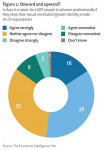Human resources needs to prove its business value in the global recession, says new report
The findings of the new report, The role of HR in uncertain times, written by the Economist Intelligence Unit and sponsored by Oracle, underscore the need for HR professionals to find ways to close this gap by becoming an acknowledged strategic partner with the business.
C K Prahalad, a professor at the University of Michigan’s Ross School of Business and best-selling author of The future of competition, explains the perception gap by noting how rare it is for HR to comprehend the operations of the business as a whole. “Show me a company where senior HR leaders fully understand the business and are as comfortable with profit-and-loss statements as any business manager,” he says. “HR has to speak the language of business if it wants to reach its full potential.”
Survey respondents say that a big obstacle for HR is that when there is a need for a reduction in headcount, human resources has an inadequate understanding of how such reductions will affect business goals. This might be due to the fact that senior managers have not explained the company’s goals. Yet the poor perception of HR at certain organisations could be improved by a more intimate knowledge of the business, as it has the potential to play an important role during the global recession.
While the economic downturn has taken a toll on businesses worldwide, the tumultuous environment also provides a unique opportunity for HR to demonstrate leadership and creativity. Indeed, the majority of survey respondents agree that when business conditions become unfavourable, senior managers rely on HR more than they do in good economic times.
“Doing more with less resources makes it imperative that HR be in sync with the business,” says Gilda Stahl, an editor at the Economist Intelligence Unit. “Developing an awareness of the skills of each employee can help HR align these to its business strategy.”
Other key findings of the study include:
· Thirty-nine percent of survey respondents say performance management is a top priority at their organisation, and 43% say it should be. An overwhelming ninety-three percent of respondents say their HR organisation has developed or is in the process of developing a quantitative performance management programme.
· Survey respondents cite four methods that are about equally successful in gaining additional productivity from employees without raising compensation costs: creating additional training programmes (44%), adopting more efficient methods of service delivery (44%), adopting more quantified and/or stringent performance evaluations (47%) and adopting mentoring programmes (47%).
웹사이트: http://www.eiu.com
연락처
Joanne McKenna
+44 (0)20 7576 8188
이메일 보내기
이 보도자료는 Economist Intelligence Unit가(이) 작성해 뉴스와이어 서비스를 통해 배포한 뉴스입니다.




